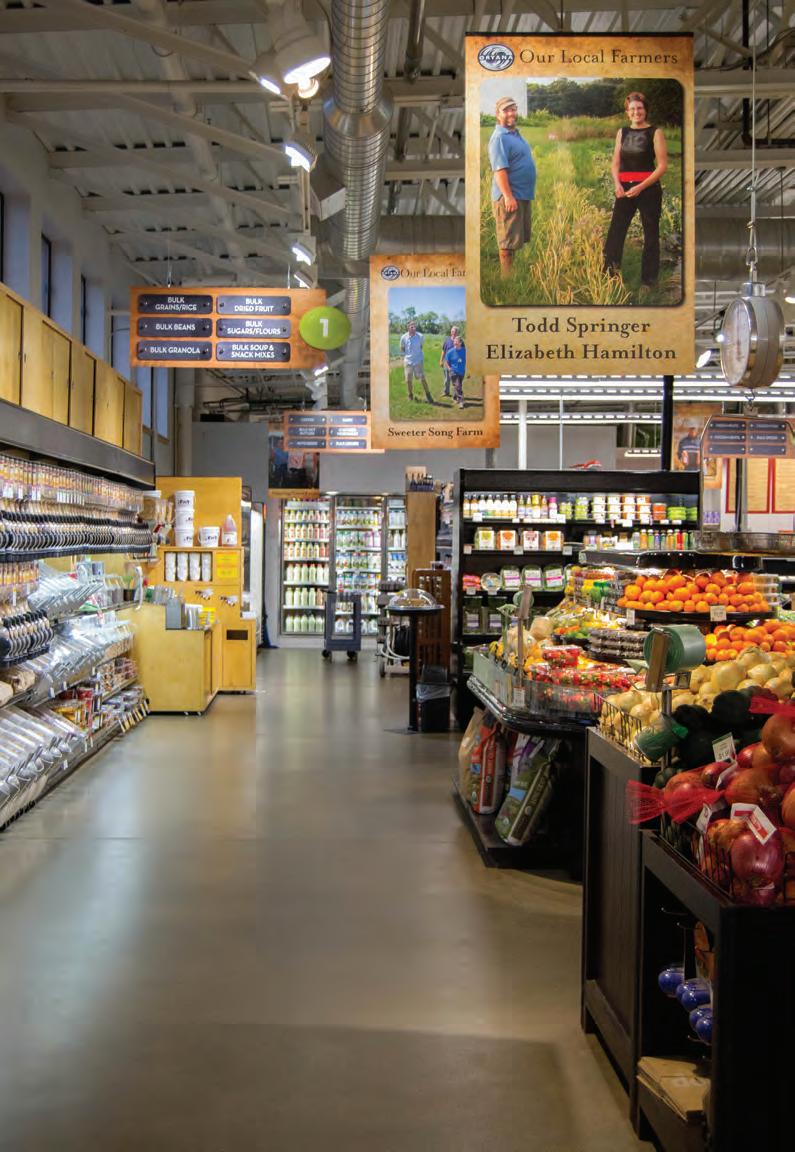
3 minute read
Up North.
THE CO-OP THAT COULD
by LYNDA TWARDOWSKI WHEATLEY
How a whole lotta heart (and a little bit of hacky sack) created a hub for healthy foods.
To look at oryana community co-op today is to witness an astonishingly well-oiled (ethically sourced, cold-pressed, whole kernel, certified-organic extra-virgin coconut) machine. Which might be more than can be said about most of us turning 50 this year.
Born of the counterculture movement, Oryana began in 1973 with a gr oup of free-thinking, healthconscious locals who, disenchanted with the highly processed factory-made and pesticide-laden Big Ag–grown foods that dominated markets at the time, pooled their money to buy bulk loads of healthy foods in Ann Arbor and bring them north to Traverse City. Then they had a better idea.

As General Manager Steve Nance tells it, “They thought, ‘We’ve got these buying clubs, but we really should get together and open a store. They wanted to have control over the food system—or part of it. They wanted healthier options. And they wanted to have something that would be fair to the [store] owners, the shoppers and the community.”
Eschewing the traditional business model, which Nance describes as “profit over everything,” the founders created a volunteer-run co-op and governing board. They selected a name, Oryana, a reference to the South American goddess of harvest and abundance, featured in a thenpopular book, Char iots of the Gods And they nabbed their first location: the back of a small house on 16th S treet—a veterans clinic by day, 3rd L evel Crisis Center at night— where 50-pound bags of beans, grains and other foods could be quickly sorted and sold, and fiery debate about whether or not to use paper towels for cleanup might take three weeks.
All owners took turns working. Sometimes they slacked—once leaving the store unattended until befuddled customers eventually found the staff outside playing hacky sack. One night, the cash bag, which held the bulk of the co-op’s working capital and was hidden inside a sack of dried beans between deposit runs to the bank, was stolen— a loss made less monumental by many loyal customers who, during the ensuing panic, paid $10 for $5 worth of food. And before Dave Poinsett—the first paid staff member, at $1 per hour—sent the IRS a letter of apology, along with payment on what he estimated Oryana owed and a promise to do better, no one thought to pay federal taxes.
Despite its freewheeling underpinnings, the co-op grew and moved to bigger and better locations: next to Ace Hardware on West Front; above Top Shoppe resale shop; inside the building that houses Bay Bread Company; and at the dead end of 10th S treet, wedged between a neighborhood and some empty, overgrown property behind McGough’s Farm & Lawn Supply—a move Nance looks back on with wonder.
“You don’t go to buy straw and horse feed, and then go, ‘I think I’ll try that trippy little grocery store.’ There was no drive-by traffic. Plus, the building was terrible. We almost didn’t make it after that move,” he says.
But, with big renovations and dozens of still heart-led but increasingly strategic changes, they did—so well, in fact, that by 2004 Oryana was the biggest co-op in Michigan and one of the busiest per square foot in the country.

During the pandemic, Oryana managed another feat: eking out a deal to buy the failed Lucky’s Market on US-31, reaching a longtime goal of a second location while preserving the jobs of 62 Lucky’s employees.
What’s to come next? “Instead of some boring, long-term strategy document, we have what we call Oryana Imagine 2030,” Nance says. “It’s a story of what success looks like. We lay out the picture of success, then we try to figure out how to get there.”
Stories can change, of course, but for now, Nance says this one imagines a third location, perhaps an outpost in Elk Rapids or Frankfort, or smaller deployments that could both cut the carbon footprint of customers driving into Traverse City and offer fresh, local, organic options to the region’s “food deserts.” More owners, increased support of Oryana staff and becoming a more model workplace might be a part of the story, too.
The plot point Nance hopes won’t be a part of Oryana’s next chapter? A belated response to those free-wheeling early days, before the fledgling co-op kept books or paid taxes. “I keep waiting for a visit from the IRS,” he says with a laugh. “They have never shown up.”
Read about other reasons to celebrate the big 50 online at oryana.coop.












